Tata Tigor
- Get link
- X
- Other Apps
Tata Tigor
What is it?
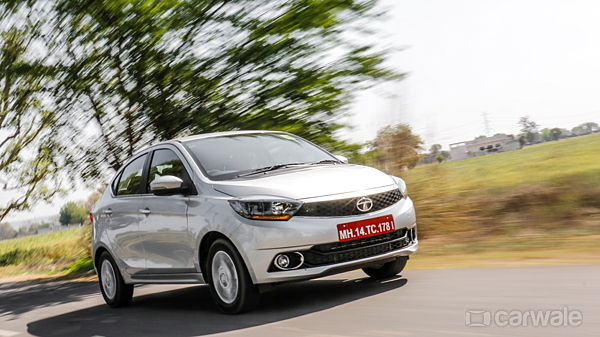
With the success of the Tiago, Tata seems even more confident of the Tigor doing well (which is essentially a compact sedan version of the hatch). Despite the recent lull for sedans in favour of crossovers, the Indian manufacturer is sure of enticing the Indian buyer with its coupe like roofline and expected aggressive pricing.
In terms of appearance, the Tigor doesn't look like a compromise as most its sub-4-metre rival’s look. The boot section is neatly integrated and thanks to the swooping roofline, it gives the Tigor a fastback like silhouette. Tata designers have also broken the rounded shape of the roofline with the integrated spoiler which avoids monotony. The boot design is done tastefully too, with the LED effect wrap-around tail lamps and the chrome strip running across lends it a premium look. Upfront front the Tigor looks exactly the same as its hatch sibling, albeit some cosmetic additions. So you get the same signature Tata smiling mesh grille with hexagonal elements and the sweptback headlamps which now are blackened out and has projector element which makes it more premium. The profile is dominated by the mildly flared wheel arches, diamond cut larger alloy wheels (only on the petrol variant) and the prominent crease running across the shoulder which lends it a sporty stance.
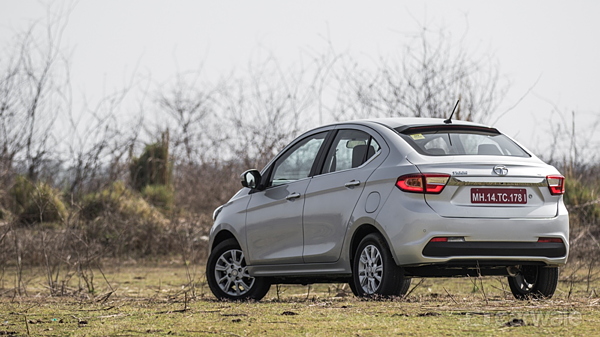
In terms of dimensions, the Tigor is 246mm longer than the Tiago and has a wheelbase that has been extended by 50mm to generate more kneeroom at the back. The Tigor petrol weighs at 1062kg and 1130kg for the diesel which has gone up by around 50kg over the Tiago.
How is it on the inside?
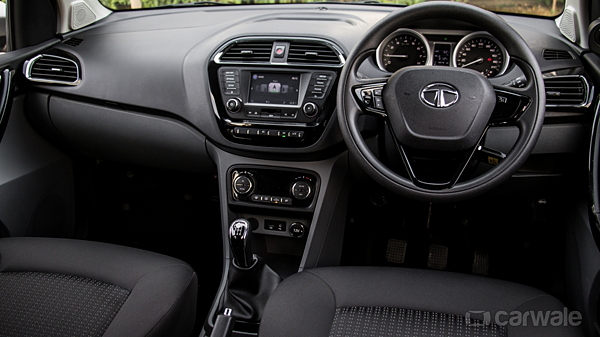
As expected the Tigor shares much of the interior elements with the Tiago. The dashboard looks really smart with the smart dash-layout and neat instrumentation console. The new touchscreen infotainment system further add to the premium look. The hexagonal theme from the exterior continues inside with the centre console, speaker grille and the steering boss design. Quality, especially on the upper portions of the dashboard and the door pads, is nice with the fish skin-like graining. Tata have also improved on touch points like on the door hand rests, which has a soft touch fabric for better comfort. Lower down, the plastics do look a bit hard and panel gaps aren’t consistent. We expected Tata to take a step further in terms of quality in the Tigor, as the higher asking price will put it up against cars especially from Hyundai, which set benchmark in this respect.
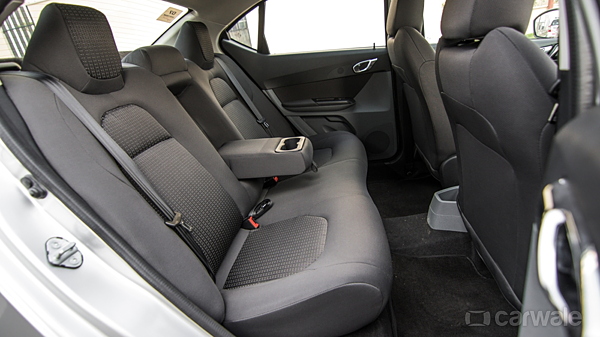
Tata have done a good job with the comfort up front and the seats are well contoured and you sit at a good height. But the driving position is not the most comfortable as the steering is placed too high and close to you. Thanks to the longer wheelbase, the rear seats are pushed back to liberate more knee room. As a result space at the rear is really good and despite the slopping roofline headroom is adequate too. The scooped out front seats and thin door pads further add precious millimetres to overall width and space. But like in the Tiago you do sit a bit low which affects under thigh support and the fact that the seat squab is on the shorter side further accentuates this deficiency. The more reclined backrest helps you sit in a more comfortable manner as compared to the Tiago. We would have also liked Tata to offer adjustable rear headrests to avoid whiplash injuries. In terms of practicality Tata has put in a lot of effort and have claimed to have 24 stowage elements in the cabin but all of them are a bit too shallow and narrow. At the rear you don’t get seatback pockets and the sloping parcel shelf makes it unusable too. Although the swooping design has compromised the boot opening, the double hinged design means, there are hardly intrusions and the 419 litre boot is well shaped and usable.
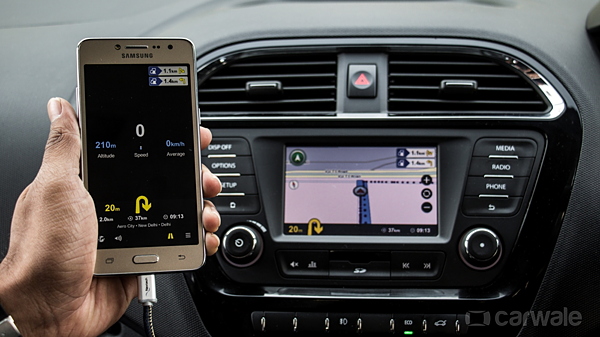
We only had the top-of-the-line XZ trim of the Tigor and it came loaded with features. Apart from the regulars like power-steering, power windows etc… the Tigor also comes with a sweet sounding Harman developed eight speaker music system, which can be played through aux-in, USB, SD card and Bluetooth connectivity. The Tigor also gets a touchscreen system that is not the smoothest of units as far as speed and touch sensitivity is concerned. Although you don’t get an inbuilt navigation system, you can pair your smartphone by downloading the CONNECTNEXT app which mirrors things like Sat-Nav (Map My India maps) onto the screen. The preloaded maps means you won’t drain through your mobile data but with back to back tests with Google Maps revealed it’s not the most accurate. The infotainment system also doubles up as a reversing camera screen, which combined with the parking sensors make up for the restricted rear view from the cabin. As far as safety goes, the Tigor gets two airbags and ABS with EBD in the top variant.
How does it drive?
The Tigor is powered by the same pair of three-cylinder engines – a 1.2 petrol and a 1.0 litre turbo-diesel as in the Tiago.
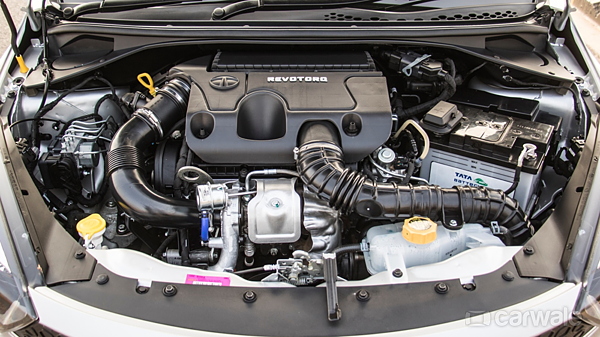
The diesel motor on the Tigor displaces a modest 1047cc, which is good for 69bhp and has a torque output of 140Nm (same as the Tiago). To counter the extra weight, Tata engineers have opted for shorter gear ratios, to make it feel as peppy as its hatch sibling. During relaxed driving around Delhi, the Tigor diesel felt impressive, right from the time you start it. The engine settles down to a smooth idle, although you do feel vibrations from the 3-cylinder motor. As soon as you let go off the clutch the Tigor was happy to amble along at slow speeds. The engine has a sweet spot between 1900-3000rpm giving it a useful mid-range. On the downside there is no punch in the proceedings. There is no point in revving the engine to its red-line too as it just makes more noise without adding much in terms of pace.
When driven in Eco mode it feels adequate at city speeds, but anything faster then you just keep hunting through the gearbox to make swift progress. The engine refinement which is impressive at low revs, changes for the worse once you are on an open road. The three-cylinder diesel thrum becomes apparent and the shortfall in displacement also becomes obvious as quick overtaking manoeuvres requires planning.
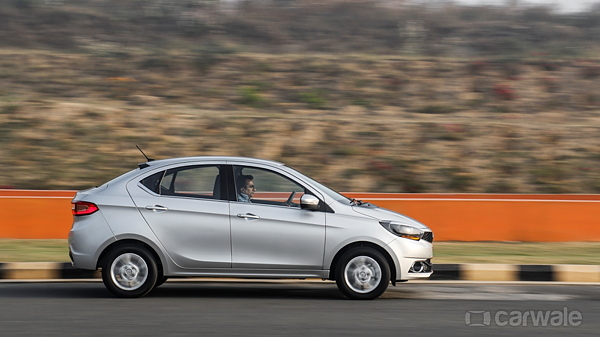
We liked the three-cylinder petrol engine more in comparison. The 1199cc motor produces a healthy 83.8bhp and 114Nm of torque and Tata have added balancer weight to make it smoother as compared to the Tiago. It is a modern motor with all-aluminium construction and variable valve timing, albeit just for intake port for better breathing. You do feel some vibrations at idle but as soon as you start moving, the engine smoothens out and as long as you don’t rev it hard, this motor is pretty silent. The Tigor doesn’t hesitate off the line and the engine pulls cleanly from low speeds. The motor doesn’t have a strong bottom end but once past 2500rpm, it feels responsive and the motor gets a second wind around 5200rpm. The performance on the highway though feels modest, especially with a full load of passengers. The gearbox is smooth enough but it has long throws and it doesn’t feel as crisp or precise as the diesel unit. We also tried out both the Eco and City modes and at low speeds there is not much of a difference, while past 3000rpm it feels noticeably flat and its best to shift to city mode out on an open stretch.
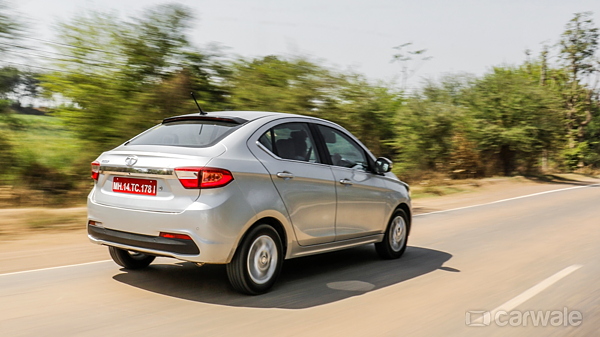
In terms of ride, the Tigor feels well sorted. While the ride feels on the firmer side at low speeds, it feels well controlled and the suspension functions silently. Up the speed and the Tigor gives you a big car feel thanks to its flat ride.. It only pitches a bit over long undulating surfaces but never to a point of feeling uncomfortable. And straight-line stability is good too, making this car ideal for long distances. Thanks to the longer wheelbase we felt the Tigor felt slightly more stable than the Tiago going through long corners and felt surefooted with no nasty surprises. The steering is engineered for an inexperienced driver with lot of slack around the centre ahead position and is not the sportiest as far as handling prowess goes. The brakes like on the Tiago are more than adequate with good progressive pedal feel and the ABS works seamlessly too.
Should I buy one?
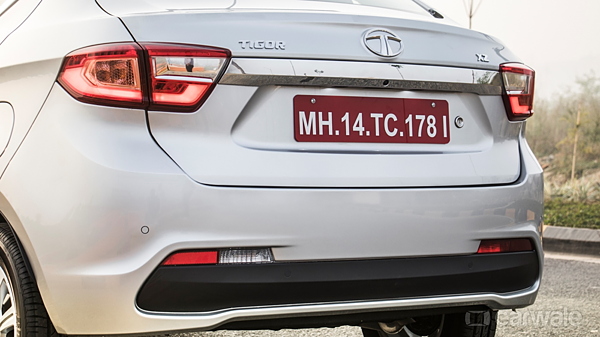
A lot depends, at what price point Tata launches the Tigor. We expect it to cost around Rs 50,000 more than the Tiago which will help it undercut all the sub-four metre sedans by a massive margin. Although the Tigor is not perfect, a surprisingly low price, will surely make the Tigor a compelling proposition. The price is not only the element which will make the Tigor a good buy come 28th of March. Things like the well-specced features list, pliant ride, striking design and a spacious cabin makes it a well-rounded product too. It seems, Tata have got yet another winner up their sleeve.
Where does it fit in?
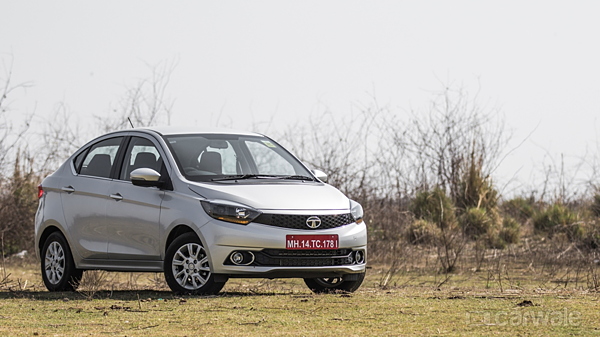
The Tata Tigor will rival premium hatchbacks like the Maruti Swift and the Hyundai Grand i10. It will also compete with lower variants of the sub-four metre sedans like the Hyundai Xcent and the Maruti Swift Dzire. We expect the Tigor prices to start around Rs 3.8 lakh for the base petrol and go all the way upto Rs 6.5 lakh ex-showroom Delhi.
- Get link
- X
- Other Apps
Comments
Post a Comment